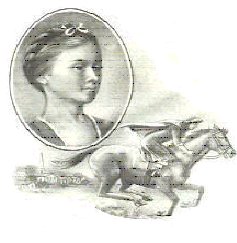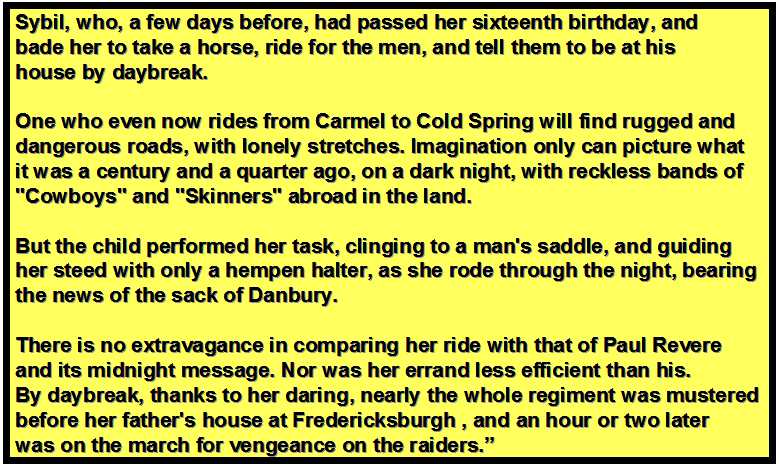
Ever Hear of Sybil Ludington? Well, You Should Know About Her!



Oh, Paul Revere did make his famous ride on April 18, 1775 and warned several villages along the way - but, he had help from two other men named Dawes and Prescott. His mission was to warn those in Concord, MA as to save the munitions stored there. He never made it that far.
Revere, Dawes, and Prescott were detained by a British Army patrol in Lincoln at a roadblock on the way to Concord. Prescott jumped his horse over a wall and escaped into the woods; he eventually reached Concord. Dawes also escaped, though he fell off his horse not long after and did not complete the ride.
Revere was captured and questioned by the British soldiers at gunpoint near Lexington. He told them of the army's movement from Boston, and that British army troops would be in some danger if they approached Lexington, because of the large number of hostile militia gathered there. Further, the British confiscated Revere's horse and they rode off on Revere's horse to warn the approaching army column.
Revere and other captives taken by the patrol were escorted east toward Lexington. About a half mile from Lexington they heard a gunshot. The British major demanded Revere explain the gunfire, and Revere replied it was a signal to "alarm the country". As the group drew closer to Lexington, the town bell began to clang rapidly, upon which one of the captives proclaimed to the British soldiers "The bell's a'ringing! The town's alarmed, and you're all dead men!" The British soldiers gathered and decided not to press further towards Lexington but instead to free the prisoners and head back to warn their commanders.
Providing actionable Intel to the enemy is not exactly what I think of when the word "heroic" is used. But, maybe that's just me. After all, Revere was not tortured or harmed in any way. In fact, the British soldiers were commended not to cause harm to the colonists nor to their property during the move toward Concord.
Not exactly the story you remember, right?
Revere's actions would have been collecting dust in the historical record had it not been for Longfellow. Some 80+ years after Revere did his ride, Logfellow decided to write his famous poem, "Paul Revere's Ride". He wrote it NOT as historical fact, but merely as a fanciful poem. His poem is replete with historical inaccuracies; again, it was not meant to be historical fact.
The poem is provided at the bottom of this article.
OK, so "Who was Sybil Ludington?", you ask. Read on.
Sybil Ludington (April 5, 1761 – February 26, 1839) was a heroine of the American Revolutionary War who is famous for her night ride on April 26, 1777, to alert American colonial forces to the approach of the British. Her action was similar to that performed by Paul Revere, though she rode more than twice the distance of Revere, rode alone, and was only 16 years old at the time of her action.
On April 27, 1777, British troops raided Danbury, Connecticut, which housed numerous Continental Army supplies. A messenger was dispatched to alert Col. Ludington, Sybil's father, arriving around 9 PM. Sybil then set out on her ride, which would end near dawn the following day. She rode 40 miles, through Carmel, New York on to Mahopac, then to Kent Cliffs, from there to Farmers Mills and back home. She used a stick to prod her horse and knock on doors. She managed to defend herself against a highwayman with a long stick. When, soaked with rain and exhausted, she returned home, most of her father's 400 soldiers were ready to march.
The memoir for Colonel Henry Ludington states,

In 2010 there was a movie made to celebrate Sybil's brave actions. Click Here if you wish to see it.
"Paul Revere's Ride" (1860) is a poem by American poet Henry Wadsworth Longfellow that commemorates the actions of American patriot Paul Revere on April 18, 1775, although with significant inaccuracies.
Of the midnight ride of Paul Revere,
On the eighteenth of April, in Seventy-Five:
Hardly a man is now alive
Who remembers that famous day and year.
- - -
He said to his friend, “If the British march
By land or sea from the town to-night,
Hang a lantern aloft in the belfry-arch
Of the North-Church-tower, as a signal-light,--
One if by land, and two if by sea;
And I on the opposite shore will be,
Ready to ride and spread the alarm
Through every Middlesex village and farm,
For the country-folk to be up and to arm.”
- - -
Then he said “Good night!” and with muffled oar
Silently rowed to the Charlestown shore,
Just as the moon rose over the bay,
Where swinging wide at her moorings lay
The Somerset, British man-of-war:
A phantom ship, with each mast and spar
Across the moon, like a prison-bar,
And a huge black hulk, that was magnified
By its own reflection in the tide.
- - -
Meanwhile, his friend, through alley and street
Wanders and watches with eager ears,
Till in the silence around him he hears
The muster of men at the barrack door,
The sound of arms, and the tramp of feet,
And the measured tread of the grenadiers
Marching down to their boats on the shore.
- - -
Then he climbed to the tower of the church,
Up the wooden stairs, with stealthy tread,
To the belfry-chamber overhead,
And startled the pigeons from their perch
On the sombre rafters, that round him made
Masses and moving shapes of shade,--
By the trembling ladder, steep and tall,
To the highest window in the wall,
Where he paused to listen and look down
A moment on the roofs of the town,
And the moonlight flowing over all.
- - -
Beneath, in the churchyard, lay the dead,
In their night-encampment on the hill,
Wrapped in silence so deep and still
That he could hear, like a sentinel’s tread,
The watchful night-wind, as it went
Creeping along from tent to tent,
And seeming to whisper, “All is well!”
A moment only he feels the spell
Of the place and the hour, and the secret dread
Of the lonely belfry and the dead;
For suddenly all his thoughts are bent
On a shadowy something far away,
Where the river widens to meet the bay, --
A line of black, that bends and floats
On the rising tide, like a bridge of boats.
- - -
Meanwhile, impatient to mount and ride,
Booted and spurred, with a heavy stride,
On the opposite shore walked Paul Revere.
Now he patted his horse’s side,
Now gazed on the landscape far and near,
Then impetuous stamped the earth,
And turned and tightened his saddle-girth;
But mostly he watched with eager search
The belfry-tower of the old North Church,
As it rose above the graves on the hill,
Lonely and spectral and sombre and still.
And lo! as he looks, on the belfry’s height,
A glimmer, and then a gleam of light!
He springs to the saddle, the bridle he turns,
But lingers and gazes, till full on his sight
A second lamp in the belfry burns!
- - -
A hurry of hoofs in a village-street,
A shape in the moonlight, a bulk in the dark,
And beneath from the pebbles, in passing, a spark
Struck out by a steed that flies fearless and fleet:
That was all! And yet, through the gloom and the light,
The fate of a nation was riding that night;
And the spark struck out by that steed, in his flight,
Kindled the land into flame with its heat.
- - -
He has left the village and mounted the steep,
And beneath him, tranquil and broad and deep,
Is the Mystic, meeting the ocean tides;
And under the alders, that skirt its edge,
Now soft on the sand, now loud on the ledge,
Is heard the tramp of his steed as he rides.
- - -
It was twelve by the village clock
When he crossed the bridge into Medford town.
He heard the crowing of the cock,
And the barking of the farmer’s dog,
And felt the damp of the river-fog,
That rises when the sun goes down.
- - -
It was one by the village clock,
When he galloped into Lexington.
He saw the gilded weathercock
Swim in the moonlight as he passed,
And the meeting-house windows, blank and bare,
Gaze at him with a spectral glare,
As if they already stood aghast
At the bloody work they would look upon.
- - -
It was two by the village clock,
When be came to the bridge in Concord town.
He heard the bleating of the flock,
And the twitter of birds among the trees,
And felt the breath of the morning breeze
Blowing over the meadows brown.
And one was safe and asleep in his bed
Who at the bridge would be first to fall,
Who that day would be lying dead,
Pierced by a British musket-ball.
- - -
You know the rest. In the books you have read,
How the British Regulars fired and fled,--
How the farmers gave them ball for ball,
From behind each fence and farmyard-wall,
Chasing the red-coats down the lane,
Then crossing the fields to emerge again
Under the trees at the turn of the road,
And only pausing to fire and load.
- - -
So through the night rode Paul Revere;
And so through the night went his cry of alarm
To every Middlesex village and farm,--
A cry of defiance, and not of fear,
A voice in the darkness, a knock at the door,
And a word that shall echo forevermore!
For, borne on the night-wind of the Past,
Through all our history, to the last,
In the hour of darkness and peril and need,
The people will waken and listen to hear
The hurrying hoof-beats of that steed,
And the midnight message of Paul Revere.